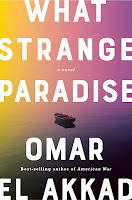Book Review: What Strange Paradise by Omar El Akkad
 |
4.5⭐️
Omar El Akkad’s What Strange Paradise is a story written along those lines. At the onset of the novel we meet Amir Utu, an eight-year-old Syrian refugee - the sole survivor of a shipwrecked boat carrying refugees to the intended destination of the island of Kos. Amir, in a semiconscious state, is found with the bodies of his deceased fellow passengers, washed up on the shores of an island in the Mediterranean. The island is depicted as a vacation destination of choice for international tourists. However, the influx of refugees seeking asylum, shipwrecks and tragedies similar to this one have also attracted much attention in the media.
“Between them, the coast guard and the morgue keep a partial count of the dead, and as of this morning it stands at 1,026 but this number is as much an abstraction as the dead themselves are to the people who live here, to whom all the shipwrecks of the previous year are a single shipwreck, all the bodies a single body.”
The narrative is split across two timelines – generically titled “Before” and “After”. The former traces the events that lead to Amir being washed ashore. We get to know the details of Amir’s family and how he got to be on that boat. We also meet some of his fellow passengers and are privy to their stories and aspirations. While they look for a better life in the West, they are not completely ignorant of the reality of their situation and how they, as refugees, are regarded in a foreign land. In the “After” timeline , we find Amir running from Colonel Dimitri Kethros and his officers who are tasked with rounding up the illegals and processing them through regulated refugee camps, the living conditions in which leave a lot to be desired. While on the run , he ends up near the home of Vanna Hermes, a young girl of fifteen, who takes it upon herself to keep him safe and help him in whatever way possible. Vanna and Amir might not speak the same language but they do communicate with each other through broken words, non-verbal cues, their hearts and humanity. When I say that this is an emotional read, I mean that as a reader you will feel a lot. In my case, I alternated between feelings of anger, frustration, shock and sorrow.
“But you can’t bet your future on work that requires the coming together of people, not now, not with the world the way it is. The days of people coming together are ending; this is a time for coming apart.”
What I found impressive about Omar El Ekkad’s style of writing is that he does not force emotions on the reader. In fact, at times the narrative comes across as factual and detached, especially in the scenes on the boat. The conversations are simply the exchange of dialogue. The events are described just as they happen. The author tells a story and gives the readers space to feel what they need to feel instead of going heavy on melodrama. This is not an entertaining or enjoyable read- the subject matter does not allow it to be. It is, however, hard-hitting and thought-provoking. The prose is straightforward and beautiful and I applaud the author’s restrained tone in narrating a story that revolves around a sensitive, controversial and polarizing issue. I commend the author for humanizing the issue and not overly politicizing it. We see the stark contrasts that define the refugee crisis -brutality and kindness, hope and despair, humanitarianism and political agenda, xenophobia and asylum, cynicism and innocence. The final chapter titled “Now” might change the way you feel about the book but ultimately this is a very well-written and relevant story that will leave a lasting impression.
“You are the temporary object of their fraudulent outrage, their fraudulent grief. They will march the streets on your behalf, they will write to politicians on your behalf, they will cry on your behalf, but you are to them in the end nothing but a hook on which to hang the best possible image of themselves. Today you are the only boy in the world and tomorrow it will be as though you never existed.”
Comments
Post a Comment